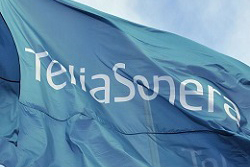TeliaSonera and cableco DNA have announced a mobile network sharing agreement in rural Finland.
The two companies said they are creating a joint venture that would concentrate on the “sparsely populated” area of Northern and Eastern Finland, which makes up 50 percent of Finland’s total territory but just 15 percent of its population.
The JV, called Suomen Yhteisverkko Oy, will build and operate a common radio access network for 2G, 3G and 4G LTE from the beginning of next year.
It will own the radio network equipment and rent masts and base station facilities from the operators or third parties.
TeliaSonera, via its Sonera subsidiary, will own 51 percent and DNA 49 percent of the company – the first of its kind in Finland.
Antti Jokinen, previously Head of Networks at DNA, has been appointed CEO of the JV.
In addition, the two operators said they will combine their 800 MHz frequency blocks to offer faster 4G connections and more capacity to their customers in the area.
Sonera, which has 3.3 million mobile customers, is required to reach 99 percent population 4G coverage in Finland by the end of 2018.
Robert Andersson, Head of TeliaSonera’s European business unit, commented: “The build-out in Eastern and Northern Finland is an important part of our ambition to improve customer experience and the efficiency of all our networks.
“We have positive experiences from network sharing in other markets. We can accelerate the roll-out of super-fast mobile internet across all of Finland.”
DNA, which provides TV and broadband services as well as telephony, has more than three million mobile and fixed customers.
CEO Jukka Leinonen commented: “The future cooperation in network construction will contribute significantly to enhancing the technical quality of network services in sparsely populated areas.
“In such a large geographic area, a mobile communications network is clearly the most reasonable solution for providing high-speed telecommunications links.
“This contract is also particularly important in enhancing signal coverage in the areas involved, with the joint network bringing the addition of a large number of Sonera’s current base station locations and masts to those of DNA.
“The agreement will also bring considerable cost savings, enabling us to construct the 4G network faster than the previously planned, separate networks.”


